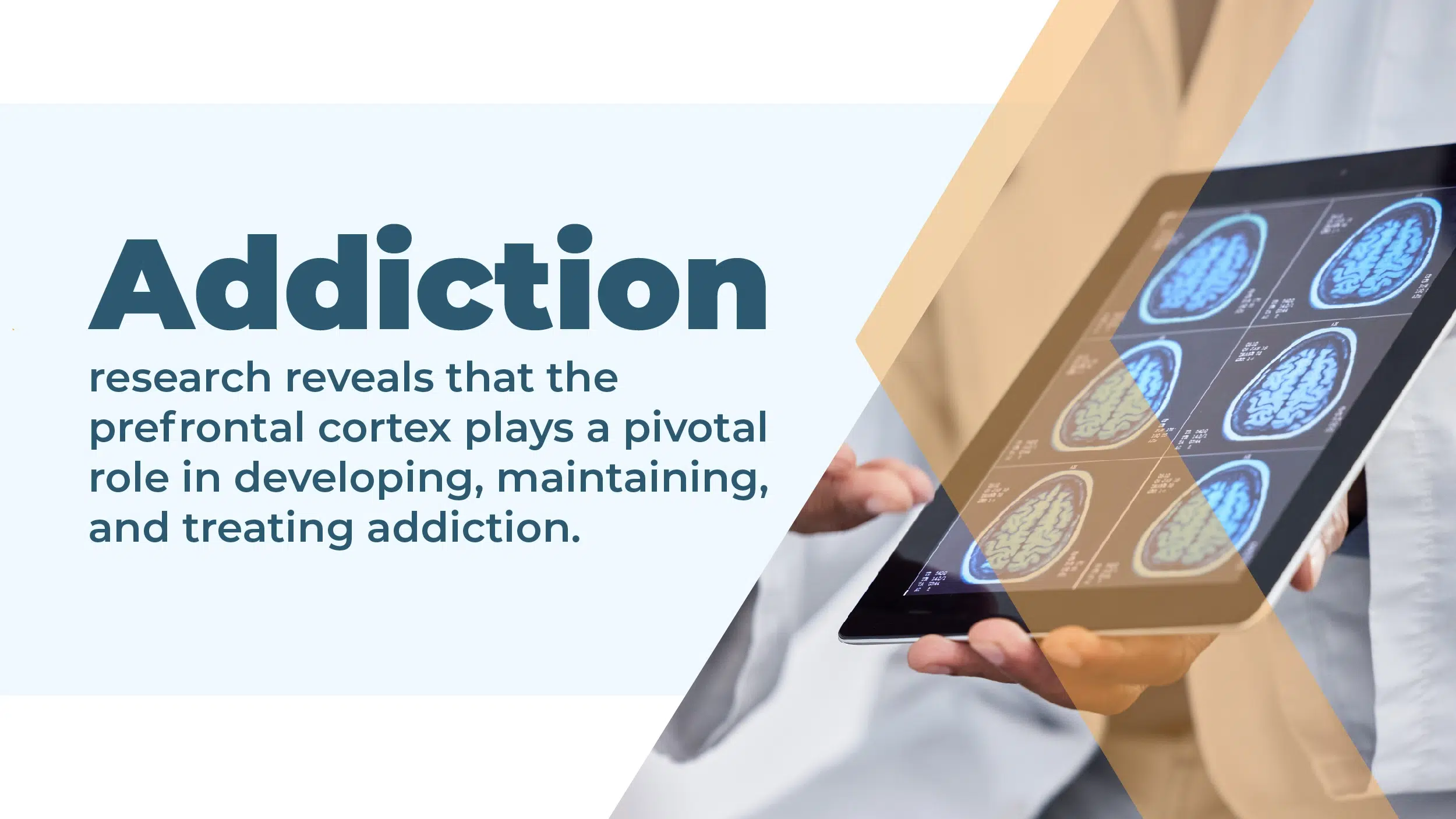Prefrontal Cortex and Addiction: Understanding the Link
The prefrontal cortex (PFC) plays a significant role in addiction development and treatment. This part of the brain is responsible for decision-making, impulse control, and weighing the consequences of our actions.
Regarding addiction, the prefrontal cortex can become compromised, making it harder for individuals to resist cravings and make rational choices. On the other hand, by targeting this brain region, therapies and interventions can help individuals regain control over their drug-seeking behaviors.
This article will explain the prefrontal cortex’s role in brain functioning, how addiction can alter its operations, and various ways to restore and strengthen its functionality during recovery.
Key Takeaways
Understanding the prefrontal cortex’s role in addiction development and treatment is important for effective interventions. Here is what you need to know:
- The prefrontal cortex controls executive functions, working memory, inhibitory control, and social behavior.
- Addiction alters the prefrontal cortex, impairing decision-making, self-control, and emotional regulation.
- Restoring the prefrontal cortex involves abstinence, therapy, mindfulness, medications, and a healthy lifestyle.
- To strengthen the prefrontal cortex post-addiction, set goals, manage stress, reconnect socially, and avoid triggers.
The Recovery Team offers hope, evidence-based treatment, and ongoing support for those dealing with alcohol and drug addiction. Contact us at (800) 817-1247 today.
Prefrontal Cortex Role: The Brain’s Control Center
The prefrontal cortex is a crucial brain area for many essential functions influencing our daily lives. Here, we’ll explore the various roles it plays in brain function:
Executive Functions
Executive functions are responsible for planning, organizing, and decision-making. The prefrontal cortex oversees these functions, helping us set goals, make strategies, and carry out tasks. For instance, it’s in action when you plan your daily schedule or decide how to study effectively.
Working Memory
Working memory is your sticky note, allowing you to hold and manipulate information temporarily. The prefrontal cortex is pivotal in this process. It helps you remember a phone number for a shorter time while you dial it or recall directions while navigating through a new place.
Inhibitory Control
Inhibitory control is like the mental brake pedal, enabling you to control your impulses and stop making hasty decisions. Your prefrontal cortex helps you avoid eating that tempting piece of cake when you’re on a diet or think before speaking during a heated argument.
Emotional Regulation
Your prefrontal cortex acts as an emotional referee, helping you manage your feelings. It ensures you can cope with stress, anxiety, and anger and maintain composure in challenging situations. It also helps you understand the emotions of others, fostering empathy and positive social interactions.
Social Behavior and Theory of Mind
The prefrontal cortex plays a key role in your social interactions. It helps you understand and predict the thoughts, intentions, and emotions of others, which is known as the “theory of mind.” This ability is crucial for empathy, making friends, and maintaining healthy relationships.
In simple terms, the prefrontal cortex is like the captain of a ship, steering your brain’s functions to navigate through the challenges and opportunities life presents. From making plans to staying calm during emotional storms, this brain region helps you chart a course to a successful and fulfilling life.
How Addiction Changes the Prefrontal Cortex
Addiction, whether it’s to substances like drugs or behaviors such as gambling, can profoundly impact the prefrontal cortex.
Altered Decision-Making
One of the most noticeable effects of addiction on the prefrontal cortex is the alteration of decision-making processes. When addiction takes hold, individuals may prioritize seeking and using the addictive substance or engaging in the addictive behavior over other essential life choices. This skewed decision-making can lead to harmful consequences.
Impaired Self-Control
The prefrontal cortex is like a guardian of self-control. It helps you resist temptations and make choices in your long-term best interest. However, addiction impairs this self-control mechanism, making it challenging for individuals to stop using the addictive substance or behavior even when aware of the negative consequences.
Reduced Cognitive Flexibility
Cognitive flexibility is the brain’s ability to adapt to new information and change strategies. Addiction tends to reduce this flexibility in the prefrontal cortex. People with addiction may struggle to switch their focus from the addictive substance or behavior to other, more constructive activities.
Altered Emotional Regulation
Addiction can also disrupt emotional regulation. The prefrontal cortex helps manage emotions, but addiction can lead to heightened emotional responses or numbness. As a result, individuals may experience intense mood swings, increased anxiety, or depression.
Weakened Inhibitory Control
The prefrontal cortex acts as a brake on impulsive and compulsive behaviors. Addiction weakens this inhibitory control, making it challenging to resist cravings and compulsions. This can lead to a vicious cycle of increased substance use or engagement in addictive behaviors.
Understanding these changes in the prefrontal cortex is essential for developing effective addiction treatments and strategies. It highlights the need to address not only the physical aspects of addiction but also the neurological changes.
Restoring Prefrontal Cortex Function
The road to recovery may seem daunting when addiction takes a toll on the prefrontal cortex, impairing vital functions. But the good thing is that this brain region has a remarkable capacity for healing and adaptation.
Cognitive Rehabilitation
Cognitive rehabilitation is a structured approach to retraining the prefrontal cortex. This involves exercises and strategies that challenge the brain and help it regain lost functions. Activities like puzzles, memory games, and problem-solving tasks can be beneficial. Over time, these exercises encourage the prefrontal cortex to become more efficient.
Therapeutic Interventions
Therapy, such as cognitive-behavioral therapy (CBT), can be a powerful tool in restoring prefrontal cortex function. CBT helps individuals identify and change negative thought patterns, improve decision-making skills, and enhance emotional regulation. The prefrontal cortex can recover its ability to make rational choices and handle emotions through regular therapy sessions.
Mindfulness and Meditation
Practices like mindfulness and meditation are increasingly recognized for their positive impact on the prefrontal cortex. They promote self-awareness and impulse control. By training the mind to be present and non-reactive, these techniques empower the prefrontal cortex to manage emotions better and reduce impulsive behaviors.
Healthy Lifestyle Choices
Physical health plays a significant role in restoring prefrontal cortex function. Regular exercise, nutritious food, and adequate sleep contribute to brain health. Physical activity, in particular, can boost blood flow to the brain, supporting recovery. In addition, a well-balanced diet rich in essential nutrients provides the brain with the resources it needs to repair itself.
Medication and Neurofeedback
In some cases, medication may be necessary to support prefrontal cortex function. Medications like stimulants or antidepressants can help improve focus, impulse control, and emotional regulation. Neurofeedback, a non-invasive technique, uses biofeedback to train the brain to function more effectively, potentially benefiting the prefrontal cortex.
Time and Persistence
Restoring prefrontal cortex function is a process that takes time. It requires time, patience, and persistence. The brain is a remarkably adaptable organ that can rewire itself with consistent efforts. Celebrate small victories along the way and understand that recovery is a journey, not a destination.
Remember, the road to recovery can be different for everyone. Therefore, individuals must work with the medical team to develop a personalized addiction treatment plan, considering their unique needs and circumstances.
Post-Addiction Healing
Overcoming addiction is a significant achievement, but the work doesn’t end there. Strengthening your prefrontal cortex post-addiction is crucial for lasting recovery and a brighter future.
Goal Setting and Planning
Setting and pursuing meaningful goals can help retrain the prefrontal cortex. Individuals can rebuild their decision-making and planning abilities by breaking down larger objectives into smaller, manageable tasks. Goal setting supports the prefrontal cortex’s executive functions, whether focusing on a career, education, or personal growth.
Stress Management
Chronic stress can weaken the prefrontal cortex, making individuals vulnerable to relapse. Stress management techniques like deep breathing, meditation, or yoga can help restore emotional regulation and cognitive flexibility. Reducing stress is essential for maintaining a strong and resilient prefrontal cortex.
Social Reintegration
Isolation often accompanies addiction. Reconnecting with friends, family, and the community can help rebuild social skills and enhance the theory of mind. Social interactions provide opportunities to practice empathy, emotional regulation, and conflict resolution, strengthening the prefrontal cortex’s role in social behavior.
Avoiding Relapse Triggers
Identifying and avoiding triggers that could lead to relapse is crucial. This may involve staying away from places or people associated with past addiction or developing strategies to cope with cravings. Avoiding relapse triggers helps the prefrontal cortex maintain self-control and decision-making in high-risk situations.
Continuing Therapy
Ongoing therapy or counseling is a valuable resource for post-addiction recovery. Regular individual or group therapy sessions provide individuals with support and tools to reinforce their prefrontal cortex functions. Therapists can help address any unresolved issues, work on coping strategies, and set realistic goals for the future.
Individuals can bolster their decision-making, self-control, and emotional regulation by actively implementing these strategies. Doing so increases their chances of maintaining a successful and fulfilling life in recovery.






